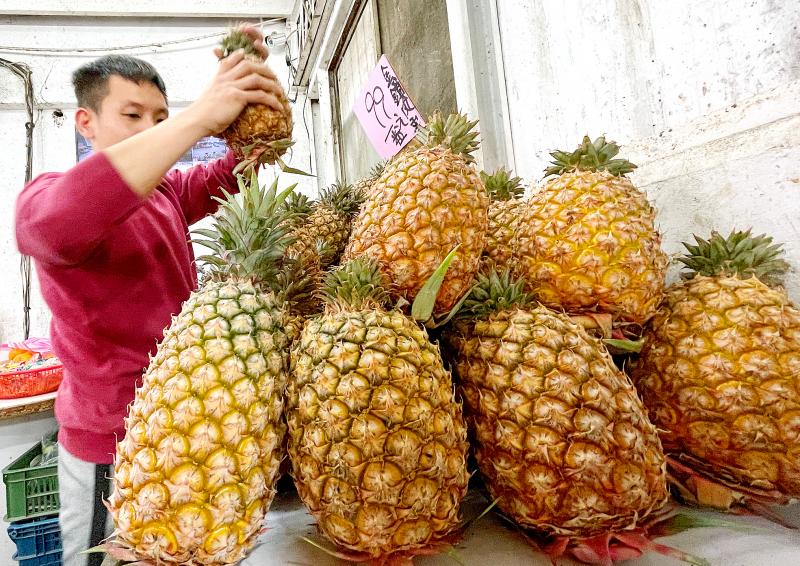More than 99 percent of pineapples sold to China passed inspections, the government said yesterday, after China earlier in the day abruptly suspended imports of pineapples from the nation, which Taipei called an “unfriendly” move.
From Monday, China is to stop importing pineapples from Taiwan, the Chinese General Administration of Customs said.
The regulation is a normal measure for ensuring biosafety, China’s Taiwan Affairs Office spokesman Ma Xiaoguang (馬曉光) said in a news release later yesterday.

Photo: Liu Hsin-de, Taipei Times
Since last year, Chinese customs officials have repeatedly seized pineapples imported from Taiwan that carried “perilous organisms,” Ma said.
Were the organisms to spread in China, they would pose a serious threat to agricultural and ecological safety, he said.
The import ban is scientifically rational and complies with Chinese law, he said.
Presidential Office spokesman Xavier Chang (張惇涵) said in a statement that since last year, 99.79 percent of Taiwan’s pineapples sold to China passed testing at customs.
China’s action is “unfriendly,” Chang said.
The Council of Agriculture (COA) announced that it would spend NT$1 billion (US$35.33 million) to promote pineapple sales at home and abroad, while President Tsai Ing-wen (蔡英文) and Vice President William Lai (賴清德) would take action to support domestic growers by consuming more pineapples themselves, Chang said.
Farmers can rest assured that the government would do its utmost to help them, he said, adding that hopefully, Taiwanese would support the local pineapple industry, just like Australians supported their country’s wine industry after China imposed high tariffs on those products.
COA Minister Chen Chi-chung (陳吉仲) said that the council had received China’s “unilateral notice” on Thursday evening, without any warning.
It attempted to express its concern to its counterpart in China, but the Chinese contact did not answer a telephone call, Chen said.
Taiwan produces nearly 420,000 tonnes of pineapples every year, and has exported 6,200 batches to China since last year, with only 13 batches, totaling 141 tonnes, failing tests, meaning the qualification rate was 99.79 percent, he said.
In “normal” international trade practices, this qualification rate is top-notch, while the few pineapples that did not pass were approved after fumigation, Chen said.
Beijing probably imposed the sanction because Taiwan’s pineapple production season is about to start, which would go against normal international trade practice, he said.
Data from the council showed that plantations in Pingtung County produce 30 percent of the nation’s pineapples, followed by Kaohsiung and Tainan (14 percent each), Chiayi County (13 percent), Nantou County (12 percent) and Hualien and Taitung counties (percentages uncertain).
Pineapple exports to all nations totaled 31,927 tonnes in 2018 and 51,476 tonnes in 2019, the data showed.
China accounted for 97 percent of exported pineapples, followed by Japan (2 percent) and Hong Kong (1 percent), the data showed.
For all produce, exports to China last year made up 20.7 percent, totaling more than US$1 billion, followed by Japan (15.5 percent) and the US (13.7 percent), the data showed.
Additional reporting by Wen Chun-hua

CHAOS: Iranians took to the streets playing celebratory music after reports of Khamenei’s death on Saturday, while mourners also gathered in Tehran yesterday Iranian Supreme Leader Ayatollah Ali Khamenei was killed in a major attack on Iran launched by Israel and the US, throwing the future of the Islamic republic into doubt and raising the risk of regional instability. Iranian state television and the state-run IRNA news agency announced the 86-year-old’s death early yesterday. US President Donald Trump said it gave Iranians their “greatest chance” to “take back” their country. The announcements came after a joint US and Israeli aerial bombardment that targeted Iranian military and governmental sites. Trump said the “heavy and pinpoint bombing” would continue through the week or as long

TRUST: The KMT said it respected the US’ timing and considerations, and hoped it would continue to honor its commitments to helping Taiwan bolster its defenses and deterrence US President Donald Trump is delaying a multibillion-dollar arms sale to Taiwan to ensure his visit to Beijing is successful, a New York Times report said. The weapons sales package has stalled in the US Department of State, the report said, citing US officials it did not identify. The White House has told agencies not to push forward ahead of Trump’s meeting with Chinese President Xi Jinping (習近平), it said. The two last month held a phone call to discuss trade and geopolitical flashpoints ahead of the summit. Xi raised the Taiwan issue and urged the US to handle arms sales to

A magnitude 5.6 earthquake struck off the coast of Yilan County at 12:37pm today, with clear shaking felt across much of northern Taiwan. There were no immediate reports of damage. The epicenter of the quake was 16.9km east-southeast of Yilan County Hall offshore at a depth of 66.8km, Central Weather Administration (CWA) data showed. The maximum intensity registered at a 4 in Yilan County’s Nanao Township (南澳) on Taiwan’s seven-tier scale. Other parts of Yilan, as well as certain areas of Hualien County, Taipei, New Taipei City, Taoyuan, Hsinchu County, Taichung and Miaoli County, recorded intensities of 3. Residents of Yilan County and Taipei received

Taiwan has secured another breakthrough in fruit exports, with jujubes, dragon fruit and lychees approved for shipment to the EU, the Ministry of Agriculture said yesterday. The Animal and Plant Health Inspection Agency on Thursday received formal notification of the approval from the EU, the ministry said, adding that the decision was expected to expand Taiwanese fruit producers’ access to high-end European markets. Taiwan exported 126 tonnes of lychees last year, valued at US$1.48 million, with Japan accounting for 102 tonnes. Other export destinations included New Zealand, Hong Kong, the US and Australia, ministry data showed. Jujube exports totaled 103 tonnes, valued at